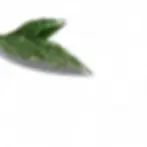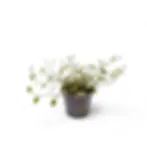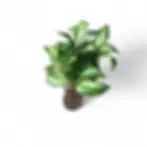Alocasia baginda 'Dragon Scale' – Iconic Jewel Alocasia with Metallic Texture
Alocasia baginda 'Dragon Scale' is one of the most admired jewel Alocasias, known for its metallic, scale-like foliage and intricate bullate texture. Native to the lowland rainforests of Kalimantan (Borneo), this terrestrial Alocasia forms silvery-green leaves with bold emerald veins and dark green to charcoal undersides. With its sculptural presence and steady growth, Alocasia baginda 'Dragon Scale' stands as an essential plant for collectors who appreciate structure, texture, and contrast.
Want to see more dragon-inspired cultivars? Visit our guide: All About the Dragons: A Complete Guide to Dragon-Named Alocasias.
● Key Traits of Alocasia baginda 'Dragon Scale'
- Signature texture: Deeply bullate, scale-like surface with a soft metallic sheen that intensifies in bright, indirect light.
- High-contrast color: Silvery-green lamina with pronounced emerald venation; undersides range from deep green to charcoal tones.
- Compact structure: Typically 50 – 90 cm tall indoors, leaves 30 – 40 cm long; bold yet space-efficient.
- Growth character: Slow, deliberate leaf production typical of jewel Alocasias, ensuring well-formed, resilient foliage.
● Natural Habitat and Growing Context
Alocasia baginda Kurniawan & P.C. Boyce (2010) originates from Central and East Kalimantan, Borneo. It grows in the understory of mixed dipterocarp forest at elevations between 50 – 250 m, rooted in rocky clay or lateritic soils under filtered light and constant humidity. These conditions translate well to indoor cultivation: consistent warmth, high humidity, and diffused light levels are key to maintaining vibrant, metallic foliage.
● Growth Form and Leaf Development
Alocasia baginda 'Dragon Scale' grows upright from a compact rhizome, producing shield-shaped leaves that unfold one at a time. Petioles are pale to medium green with darker mottling, contrasting beautifully against the metallic lamina. Each leaf takes time to harden, developing full texture and sheen gradually — a hallmark of its ornamental appeal.
● Indoor Care Guide for Alocasia baginda 'Dragon Scale'
- Light: Bright, indirect light highlights texture and depth of colour. Avoid direct midday sun to prevent scorch.
- Watering: Allow the top 10 – 15 % of the mix to dry before watering. Always provide drainage to prevent root rot.
- Humidity: Aim for 60 % RH or higher. Consistent air moisture supports glossy, healthy leaves.
- Temperature: Maintain 18 – 26 °C; avoid cold drafts and sudden changes. Warm, steady conditions encourage active growth.
- Air Circulation: Gentle airflow helps prevent fungal issues and promotes even leaf development.
- Substrate: Use a well-aerated aroid mix with orchid bark, perlite, and coco coir for structure and moisture balance.
- Feeding: Apply diluted balanced fertilizer every 4 – 6 weeks in active growth; avoid overfeeding.
- Repotting: Refresh mix every 12 – 24 months. Choose a pot only slightly larger to maintain healthy aeration.
- Pest Management: Inspect regularly for spider mites or mealybugs. Treat early with insecticidal soap or integrate beneficial insects.
- Semi-hydro Option: Thrives in mineral or semi-hydro substrates with balanced nutrients and routine water changes.
● Flowering Indoors – Subtle and Decorative
Inflorescences of Alocasia baginda 'Dragon Scale' are pale green and uncommon indoors. Many growers remove them to redirect energy toward new foliage — a safe and harmless practice.
● Styling Ideas for Modern Interiors
Pair Alocasia baginda 'Dragon Scale' with matte or dark ceramic planters for contrast. Its sculptural form makes it perfect as a focal plant in tropical or minimalist interior designs, especially when combined with velvet-leaved species for textural layering.
● Common Issues and Practical Fixes
- Yellowing leaves: Typically due to excess moisture or low light. Increase light and extend dry intervals slightly.
- Brown tips or edges: Usually from low humidity or mineral buildup — boost humidity and flush substrate periodically.
- Pale new growth: Often linked to low light or mild nutrient shortage — adjust placement and feeding schedule.
- Leaf curling: Caused by underwatering, strong sun, or dry air — restore consistent moisture and stable light.
- Drooping foliage: Usually a response to irregular watering or temperature stress. Maintain steady care routine.
● Collector Notes and Plant Background
Alocasia baginda 'Dragon Scale' is widely loved for its architectural form, metallic tone, and long-lasting leaves. Propagated commercially for consistency, it remains a must-have for anyone building a refined indoor plant collection.
● Name Origin and Botanical Reference
“Baginda” means “king” in Malay, reflecting regal stature, while “Dragon Scale” describes the leaf’s armored appearance. The species was formally described in 2010 by Kurniawan & P.C. Boyce from Borneo specimens.
● FAQs – Alocasia baginda 'Dragon Scale'
- What soil mix works best? A chunky aroid mix with bark, perlite, and coco coir ensures drainage and moisture balance.
- Can it tolerate low light? Prefers bright, filtered light. In dimmer settings, growth slows and colour contrast softens.
- How fast does it grow? Produces a few leaves per season under steady warmth and humidity.
- Can it grow outdoors? Yes, in frost-free regions with shade and protection from heavy rain.
- Why does one leaf yellow as a new one forms? Normal growth cycle — older leaves often fade as new ones mature.
- Does it flower indoors? Occasionally; blooms are often removed to maintain foliage focus.
- Is it pet-safe? No — contains calcium oxalate crystals that can irritate if ingested.
● Bring Alocasia baginda 'Dragon Scale' Home
Bring home Alocasia baginda 'Dragon Scale' — an iconic jewel Alocasia celebrated for metallic, scale-textured leaves, striking structure, and deep emerald tones that elevate any indoor space.
Alocasia baginda 'Dragon scale'
Alocasia baginda 'Dragon scale' comes in following sizes:
Plug (Starter Plant) – ⌀ 2 cm,is approximately 10 cm tall
Baby Plant – is approximately 12 cm tall and comes in a ⌀ 6 cm pot
S – is approximately 15 cm tall and comes in a ⌀ 10 cm pot
M – is approximately 25 cm tall and comes in a ⌀ 12 cm pot
L – is approximately 45 cm tall and comes in a ⌀ 19 cm pot






























